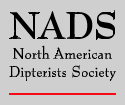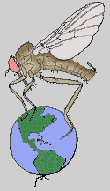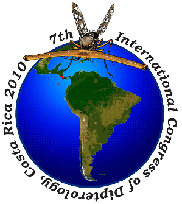| 














 

 |
|
International Congresses of Dipterology
| Return
to ICD homepage
Council Minutes from ICD7
Provided here are the minutes of the Council meetings held during
the 7th International Congress of Dipterology, San José, Costa Rica, 8–13 August 2010. |
|
First
Council Meeting
Minutes
of the first Council Meeting at the San José Congress, held in the Ramada Herredura Hotel on 8 August 2010 at 14.45 hours.
| Present: |
David Yeates (Chairman), Neal Evenhuis (Vice Chairman), Adrian Pont (Secretary), Irina Brake, Marcia Couri, Marion Kotrba, James O’Hara, Thomas Pape, Marc Pollet, Masaaki Suwa, Brian Wiegmann, Shaun Winterton, Manuel Zumbado.
|
| |
| Items |
In opening the meeting, David Yeates welcomed Council members to the meeting, and expressed his belief that the Congress would be a positive and successful one.
-
Apologies
for absence
Apologies for absence were received from David Barraclough and Rudolf Meier.
-
Approval
of minutes
David Yeates thanked Adrian Pont and Marion Kotrba for preparing minutes of the Council meetings in Fukuoka (2006) and Durban (2008), respectively. The minutes were approved. Proposed by Jim O’Hara, seconded by Thomas Pape.
-
Secretary/Treasurer’s
report
The Secretary gave a brief report on his activities since the last Congress, as were outlined in the Agenda. Since no expenses have been involved, the Council account now stands at GBP 2870.85 (US $4474, €3473) to which should be added the GBP 79.63 (US $124, €96) that has been in the account since 2002.
-
Donation to Council from the Organising Committee of ICD6 in 2006
It was decided that there was no urgency to disburse the Council funds, and that the best course for the present was to keep them as possible loans of seed money for future Congresses.
-
Election of new Council members
The four Council members who had reached the end of their term and were not seeking re-election were thanked
for their service: David Barraclough, Neal Evenhuis, Adrian Pont and David Yeates.
Four members had reached the end of their term and were seeking re-election: Marion Kotrba,
James O’Hara, Marc Pollet and Manuel Zumbado.
In addition, four candidates had put their names
forward for election to Council: Dan Bickel (Australia), Steve Gaimari (USA), Ashley Kirk-Spriggs (South Africa)
and Angeles Marcos-Garcia (Spain).
It was proposed by Neal Evenhuis, seconded by Brian Wiegmann, that the
election of these eight Council members should be made as a single block vote, and they were duly
elected by a unanimous show of hands.
-
Election of new Council officers
Nominations for the offices of Chairman, Vice-Chairman and Secretary/Treasurer were:
Chairman: Thomas Pape
Vice-Chairman: Rudolf Meier
Secretary/Treasurer: Marion Kotrba
It was proposed by Neal Evenhuis, seconded by David Yeates, that these three appointments should be made as a single block vote,
and these three were elected by a unanimous show of hands and
acclamation.
-
Election of Honorary Congress Members
There were three candidates proposed for Honorary Membership, to take the number of Honorary Members up to seven,
although it was agreed that there was no reason why the Constitution could not be amended to
allow for ten or even more Honorary Members:
Dr Fan Zide (Shanghai, China), proposed by Thomas Pape and seconded by Brian Wiegmann.
Dr Emilia Narchuk (St Petersburg, Russia), proposed by Irina Brake and seconded by Shaun Winterton.
Dr F. Christian Thompson (Washington, USA), proposed by Marion Kotrba and seconded by Manuel Zumbado.
The elections were carried by a unanimous show of hands and
acclamation.
-
Bid to host ICD8 in 2014
There was one bid to host ICD8 in 2014, from Germany, and it was presented by Netta Dorchin.
A summary of her proposal is given here.
Germany has a long tradition of dipterology and an active
group of 127 dipterists (www.ak-diptera.de). The organising committee will include Netta Dorchin,
Marion Kotrba, Frank Menzel, Joachim Ziegler and two-three further colleagues. A provisional logo was shown.
The proposed venue is the Kongresshotel Potsdam, with
Berlin as a back-up should Potsdam prove too
expensive – negotiations are in progress. It is some 30 minutes from Tegel airport and 50 minutes
from Schönefeld airport, and is situated on the banks of the Templiner Lake and only a short distance
from the railway station. It is an ideal Congress venue, being a modern and spacious hotel. The main
Kongresshall seats 500. There is another room with 80 seats, and smaller rooms with 45-50 seats. There
are areas for exhibitions and posters, and a computer room with 15-20 computers. There are two restaurants
for receptions and banquets, and a bar.
The living area adjoins the Congress centre. Single rooms
cost €85, double rooms €100. There are also relaxation areas.
Proposed social functions include
the reception and banquet; a cruise on the Templiner Lake; tours around Frederick the Great’s Potsdam
and Sans Souci palaces. A second possible venue for the banquet is the Zoologisches Museum in Berlin,
where it is hoped that the celebrated fly exhibition will be on loan from Neuchâtel. There may be other
exhibitions, for example to celebrate the 250th anniversary of the birth of J.W.Meigen, the founder of European
dipterology.
A professional company, PCMA in Berlin, will be engaged as Congress organiser and marketing agency.
The Congress budget is extremely tight at present. With 300 participants, the hotel cost will be €124,055 and
the PCMA fee €20,825. With 350 participants, the costs will be €111,130 and €20,150, respectively.
The cost of the abstract volume and programme, around €5000, would be offset by anticipated sponsorship of €5000.
PCMA is already searching for sponsors. Income would come from a registration fee of €350 and an anticipated grant
from the Deutsche Forschungs-Gesellschaft of €28,000.
In the discussion that followed it was pointed out that the
registration fee could be increased in order to give more financial security. A reduced rate for students and a day
rate were mentioned, as was also the use of students as helpers. Netta also mentioned that there were other hotels
and guest houses in Potsdam if individuals found the hotel too expensive, and that the committee had not ruled out
Berlin in case an affordable deal with the Potsdam Kongresshotel could not be reached.
Netta was thanked for her
excellent and detailed presentation. It was moved that the bid be accepted, proposed by David Yeates, seconded by
Neal Evenhuis, and it was accepted by a unanimous vote. An announcement would be made at the first plenary session on Monday.
-
The proposed formation of an International Society of Dipterology
Chris Thompson had been invited to take part in this part of the meeting, and he opened the discussion with a brief
presentation in which he outlined the rationale, role and function of an International Society of Dipterology.
The hymenopterists have an international society, and the dipterological community is now ready to move on and to adopt a more formal role.
Such a society would lead to the elevation and recognition of our science by other sciences, and the better coordination and
focus provided by a society would lead to a greater international recognition. The basic functions of a society are to provide
a journal in which research papers can be published and to organise meetings/congresses. By expanding its constitution, the
ICD Council could take a leading role in the formation of such a Society, or an entirely new entity could be created.
The management of common resources is better carried out by a group than by individuals, and our resources such as Myia,
Studia Dipterologica and BDWD all need a guarantee of security and continuity. Whilst Studia Dipterologica appears to be
slipping and in need of support, Myia will in future be published by Pensoft and in four volumes over the next year.
There followed an extended and detailed discussion, in which many Council members put forward their views about the role,
purpose and function of the proposed society. Initially, this focused on the matter of a journal. It was felt that there were
major changes taking place in publishing: the future of small journals was insecure and many would be replaced by digital publications.
The partnership between the Willi Hennig Society and Academic Press was cited as a successful and high quality venture. However, it was
felt that at this stage a society and a journal were separate issues. At its inception, the society should be a means of coordination,
and this would be achieved by an on-line Newsletter, available free to anyone who wished to register. Such a course would obviate the need
for expensive dues, although a small levy might be required to get things started (say, $USD20), and this would make the running of the
society a much simpler and less time-consuming matter for the officers. Most importantly, it would provide coherence among the
dipterological community which is currently too fractured. It would coordinate all the groups (e.g. mosquitoes, fruit flies,
chironomid midges, etc) and present a unified view of dipterology to the general and scientific public. In the course of time it
would be possible to increase the level of dues to provide assets which could support various dipterological activities such as the BDWD [now Systema Dipterorum],
seed money for Congresses, possibly print Congress proceedings, support for students to attend Congresses, maintenance of the
Diptera website, or even support a journal.
It was finally decided that the project of an International Society of Dipterology
should go ahead, and that a resolution to that effect, drafted by David Yeates, Thomas Pape and Chris Thompson, should be read out at the
first plenary session on Monday. The ICD Council would eventually operate independently of the society, but at this stage would take
the lead in drafting a Constitution and in putting the proposal on-line in order to solicit comments from the wider dipterological community.
- Any other business
In response to an enquiry, Manuel Zumbado gave a brief statement on the Congress finances, and also confirmed that a public vote of thanks
would be given to Monty Wood, Hazel Ramirez, and the others who had assisted with the Congress organisation, programme and abstracts.
It was also suggested that an effort should be made to broaden the scope of the
Congresses by attracting more contributions from the applied agricultural and medical fields.
The
meeting closed at 1700 hours. |
|
| Second
Council Meeting
Minutes
of the second Council Meeting at the San José Congress, held in the Mediterranean Restaurant of the Ramada Herredura Hotel
on 12 August 2010 at 19.00 hours.
| Present: |
All thirteen Council members in Costa Rica were present,
together with the four newly-elected Council members. |
| |
|
David Yeates extended a welcome to the four new members of Council, and also thanked Manuel on behalf of
all present for the superb organisation of the Congress. Council now has its full complement of 15 members.
It was agreed that the new Council chairman and secretary
would now move the proposed society forward, with advice from Chris Thompson, and that for the present there would be
no dues and that a newsletter (possibly Fly Times) would provide the means of communication among members.
Toasts were proposed to Manuel for his organisation of
a most successful and enjoyable Congress; to the new Council members and the new Council officers;
to the outgoing Chairman David Yeates for his years of service to the Council and the Congresses;
and to the future International Society of Dipterology and the future of dipterology.
The meeting closed after dinner, at about 22.00 hours.
Adrian
C. Pont
Secretary/Treasurer
23 August 2010
|
|
First published on the Internet on 2 September 2010
J.E. O'Hara |





